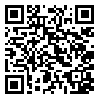BibTeX | RIS | EndNote | Medlars | ProCite | Reference Manager | RefWorks
Send citation to:
URL: http://jms.thums.ac.ir/article-1-419-en.html
2- Allameh Tabataba'I University
Background & Aim: Despite the growing statistics of people with HIV-positive in Iran, little attention has been paid to the poor quality of their life and the adverse psychological status of these patients. This study aimed to investigate the effectiveness of group Hope Therapy on the improvement of Dysfunctional Attitudes and the increase of hope in HIV positive patients.
Methods: the research method of the present study was semi-experimental with pretest-posttest and control group. The study population included HIV-positive patients from Robat Karim city referring to behavioral health counseling centers. 28 patients were selected by simple randomized sampling and were assigned to the two groups. The experimental group received eight sessions of group hope-therapy. This research was a semi experimental study that included pretest-posttest and control group. The information was collected through the Snyder Hope Questionnaire and Dysfunctional Attitudes Scale. The obtained data were analyzed using ANCOVA and MANCOVA and via SPSS version 21.
Results: Analysis of the data showed that the group hope therapy was effective in increasing hope of HIV-positive patients (Psuccess/perfectionism attitudes and need to keep others satisfied attitudes (P Conclusion: The findings revealed that more attention must be paid to the psychological health and quality of life of the HIV-positive patients. Group therapy and especially hope therapy could increase hope and inversely decrease dysfunctional attitudes among such patients.
Received: 2017/07/13 | Accepted: 2017/10/7 | Published: 2017/10/7
| Rights and permissions | |
 | This work is licensed under a Creative Commons Attribution-NonCommercial 4.0 International License. |





